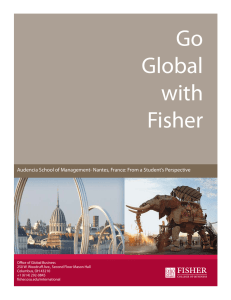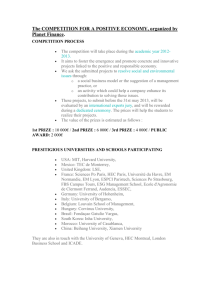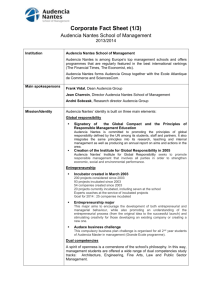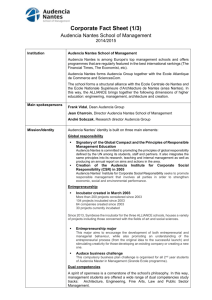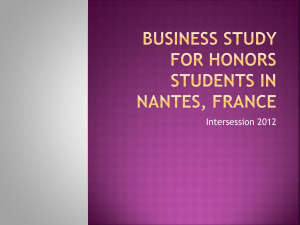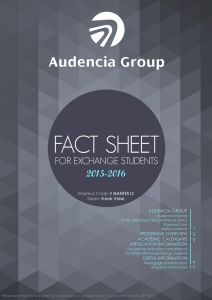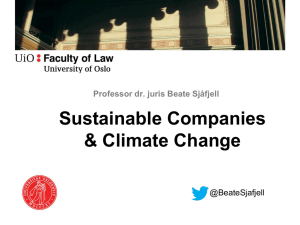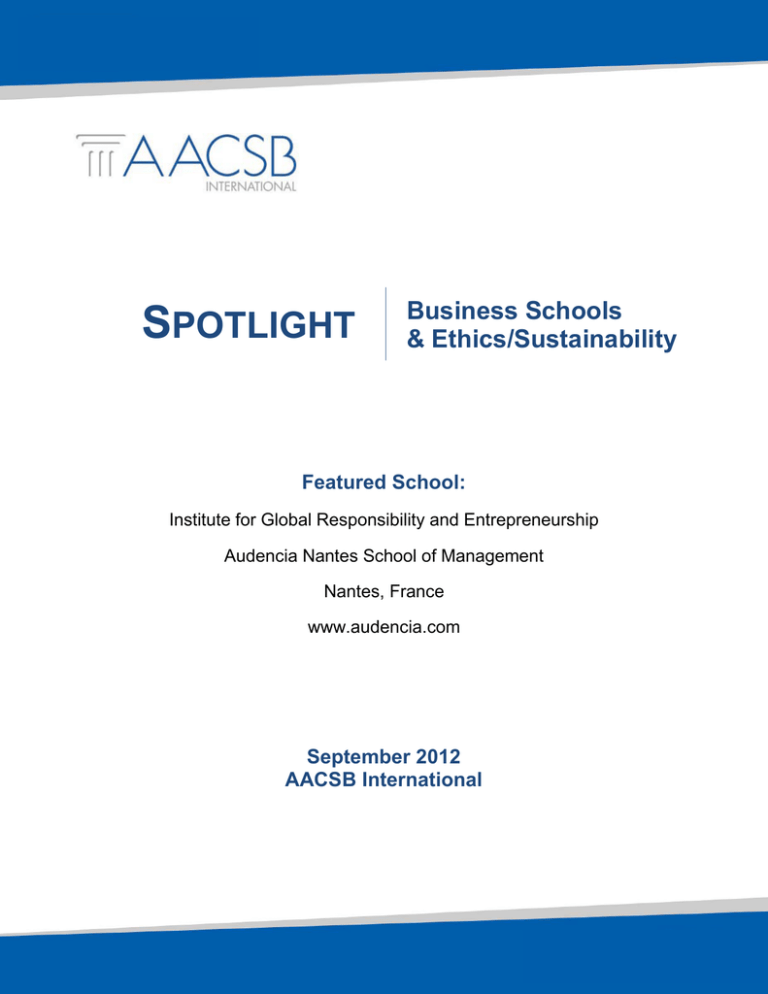
SPOTLIGHT
Business Schools
& Ethics/Sustainability
Featured School:
Institute for Global Responsibility and Entrepreneurship
Audencia Nantes School of Management
Nantes, France
www.audencia.com
September 2012
AACSB International
SPOTLIGHT | Business Schools & Ethics/Sustainability
Audencia
Audencia Nantes School of Management – Institute for Global
Responsibility and Entrepreneurship
In 2004, Audencia Nantes School of Management became the first institution of higher education in
France to sign the United Nations Global Compact, a “strategic policy initiative for businesses that are
committed to aligning their operations and strategies with ten universally accepted principles in the areas
1
of human rights, labor, environment, and anti-corruption.” Since signing the Compact, Audencia has
become a leader in carrying out this initiative, especially after creating the Institute of Global
Responsibility in 2005. Audencia was also heavily involved with defining the Principles of Responsible
Management in Education (PRME), and consequently was one of the first schools in the world to become
a member.
André Sobczak, the director of the Institute of Global Responsibility and Entrepreneurship (IGRE),
explains that the main impetus for establishing the Institute was to coordinate and disseminate the
school’s different activities related to corporate social responsibility (CSR) and sustainability in research,
teaching, corporate partnerships, and internal management. Since 2005, the Institute has become the
largest research center at the School. Unlike many of the other centers at Audencia, Sobczak adds that
IGRE is much more transversal and interdisciplinary in nature, frequently working on projects with other
departments at the School. In 2008, the Institute of Global Responsibility added “Entrepreneurship” to its
title to reflect its commitment to merging CSR and entrepreneurship in its portfolio of activities.
Activities
IGRE focuses its activities in three main ways: teaching, outreach, and research. The Institute works with
the School in coordinating all teaching activities in relation to subject matter, including mandatory and
elective courses in all programs. In 2010, the School signed an agreement with the World Wildlife Fund
for Nature (WWF) France with the objective of integrating environmental issues into teaching and
reducing the school’s environmental footprint. Through the partnership, Audencia has introduced
mandatory courses on CSR and sustainability in all programs, offers a series of elective courses, and has
started to work with the entire faculty to integrate Global Responsibility into all courses, aiming to have at
2
least 10 percent of each course dedicated to CSR by 2013. The Institute thus works with program
directors and heads of departments on integrating CSR and environmental content into their curricula.
Serge Orru, CEO of the WWF France, states that the ultimate goal of the partnership is “every student
3
coming out of Audencia is aware and trained to become a future agent of change.” Together with the
WWF, the Institute hosts conferences, workshops, and training programs related to sustainable
development and global responsibility geared towards students, faculty, and staff members.
© AACSB International. All Rights Reserved.
SPOTLIGHT | Business Schools & Ethics/Sustainability
Entrepreneurial Thinking Linked with Social Responsibility
As suggested by the Institute’s name, entrepreneurship plays an important role in the center’s activities.
Sobczak explains that the focus is linking social innovation with sustainability and CSR. The Institute also
hosts an incubator that works with the Institute on projects that follow sustainable models and helps
launch businesses that aim to decrease energy consumption. He also adds that the Institute does not
take on “any project that compromises its commitment to global responsibility.”
IGRE works closely with companies, local government, and other stakeholders in helping them implement
policies designed to improve their performance and simultaneously helping them increase their positive
4
contribution to the environment and society. However, Sobczak emphasizes that the Institute’s role here
is not that of a consultant: “We help companies change their way of analyzing problems. We try to provide
firms with new ideas and strategies so their partners can self-implement.”
Recently, the City government of Nantes approached Audencia for help in finding ways to encourage
local businesses to incorporate more CSR into their practices. Master’s and doctoral students interviewed
companies, NGOs, trade unions, and other stakeholders to identify which CSR activities have shown to
work and benefit these companies. This effort led to creation of a website where all managers of small
and medium enterprises (SMEs) can access information and testimonials by other companies on
implementing CSR into their business practices. In addition to helping businesses, the website also
serves as a resource to students and faculty conducting research in this area, providing them with a large
network of contacts for potential case studies to research and analyze.
Emphasizing Critical Thinking
As touched on earlier, the research produced by the IGRE is very influential on student and teaching
activities at the School. Audencia firmly believes that critical thinking is an important skill to develop and
nurture among students in order to cultivate socially responsible business leaders, and not “business
mindsets that cause financial crises.” As critical thinking is a challenging skill to teach within traditional
courses, faculty work with the IGRE in inviting union representatives, environmental NGOs (e.g., the
WWF), and government officials to provide students with different perspectives on business and social
issues. Students learn how to think more critically when creating new solutions to economic and social
problems that are relatable and relevant in different contexts.
The School works together with the Institute in developing project-based pedagogy for students that
follow a social responsibility theme. Sobczak shares one example in which students are asked to develop
a project that helps deprived children with social disabilities in the Nantes area. Students go “on-site” and
© AACSB International. All Rights Reserved.
Audencia
SPOTLIGHT | Business Schools & Ethics/Sustainability
work directly with the children. The group of students with the best project proposal receives corporate
funding to implement their idea. Sobczak explains that many of the students come from comfortable
backgrounds, and projects such as this help them become better aware of social issues, and prepare
them to work with employees with diverse backgrounds in the future.
Social Responsibility Ingrained in the School
Sobczak explains that Audencia’s strong focus and commitment to global responsibility was practiced
long before its involvement with the PRME, yet it played an important role in bringing an international
dimension to the School’s CSR activities. By connecting with other institutions with similar beliefs on the
importance of global responsibility and the integration of CSR from all around the world, Audencia has
been able to bring more visibility to the issues and activities in Western France. Involvement with the UN
was also a huge draw for local companies and businesses to become better involved with the business
school.
Incorporating social responsibility and sustainability into the management of the School itself is also an
important area of focus – “It is difficult to teach and undertake research on this when you are not an
example yourself,” Sobczak says. The School has a full-time staff member who works specifically on
incorporating CSR into the School’s management structure. Since then the School has re-defined its
purchasing criteria, diversified its recruiting, as well as revamping the School’s cafeteria to use only local
and organic products. This has had a huge impact on the pride of the employees and staff at the School,”
adds Sobczak, “and they work hard at ‘walking the talk’.”
Acknowledgements: AACSB International is grateful for the assistance of André Sobczak, the director of
the Institute of Global Responsibility and Entrepreneurship (IGRE).
© AACSB International. All Rights Reserved.
Audencia
SPOTLIGHT | Business Schools & Ethics/Sustainability
End Notes
1
United Nations Global Compact (2012). Overview of the UN Global Compact webpage,
http://www.unglobalcompact.org/AboutTheGC/index.html, accessed on August 27, 2012
2
th
Principles of Responsible Management Education (PRME) (2011). “2011 Report on Progress: 6 Annual Report on
the UN Principles of Responsible Management Education” pg. 4
3
th
Principles of Responsible Management Education (PRME) (2011). “2011 Report on Progress: 6 Annual Report on
the UN Principles of Responsible Management Education” pg. 11
4
Audencia Nantes School of Management (2012). Institute for Global Responsibility and Entrepreneurship web
page, http://www.audencia.com/en/faculty-research/institute-for-global-responsibility-and-entrepreneurship/,
accessed on August 20, 2012.
© AACSB International. All Rights Reserved.
Audencia

